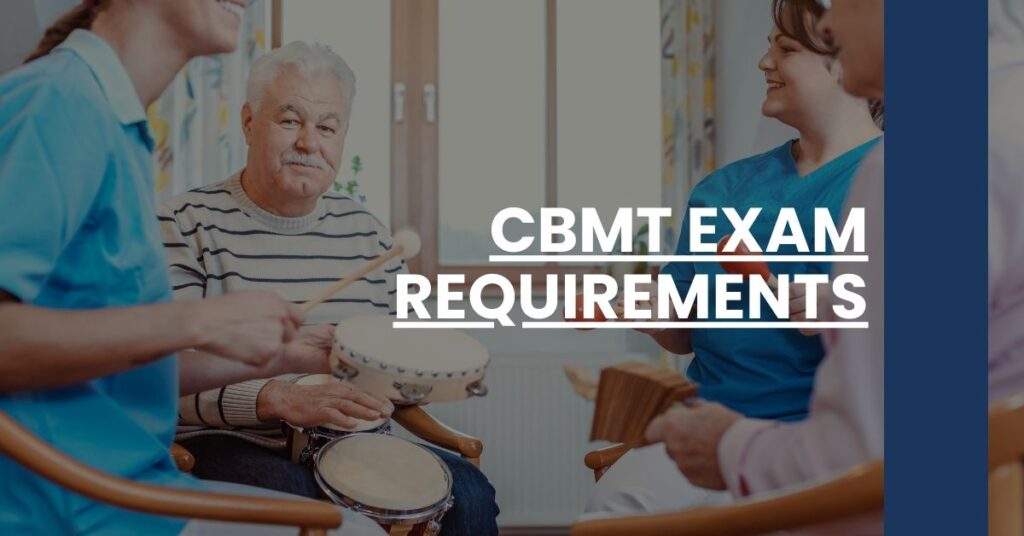Master the CBMT exam requirements and propel your music therapy career.
- Eligibility Criteria: Learn the essential educational and clinical experiences necessary for CBMT exam preparation.
- Application Process: Understand the streamlined steps to apply, ensuring you meet all CBMT exam standards.
- Study Resources: Access tailored study material aligned with the CBMT exam content outline.
Navigate CBMT exam requirements efficiently with these insights.
- Understanding the CBMT and the Certification Process
- Prerequisites for the CBMT Exam
- Educational Pathways to CBMT Eligibility
- Clinical Training and Internship Requirements
- The Application Process for the CBMT Exam
- Study and Preparation Tips for the CBMT Exam
- What to Expect on Exam Day
- Post-Exam Procedure: Scoring and Retake Policy
- Maintaining Certification: Continuing Education and Renewal
- Conclusion: Next Steps after Meeting CBMT Exam Criteria
Understanding the CBMT and the Certification Process
Embarking on the path to becoming a certified music therapist is an inspiring and transformative journey. The Certification Board for Music Therapists (CBMT) is the beacon for this voyage, illuminating the professional standards and competencies required to excel in the field.
Why is certification important? Music therapists play a pivotal role in healthcare, using music interventions to address physical, emotional, cognitive, and social needs of individuals. Therefore, just as any healthcare services provider, a music therapist must be thoroughly vetted. Certification through the CBMT ensures that only qualified individuals practice music therapy, safeguarding the profession’s integrity and public trust.
Certification is not simply a formality, it’s a profound responsibility. It signifies a commitment to lifelong learning and adherence to a stringent code of ethics. Under the umbrella of the CBMT examination process, music therapists become Board-Certified (MT-BC), a title that is synonymous with excellence and recognized across the United States.
What Does the Examination Cover?
- Comprehensive Understanding: Expect questions that probe deep into your knowledge of music therapy principles and practices.
- Practical Proficiency: Prepare to demonstrate your grasp of applying music therapy techniques in various clinical settings.
- Ethical Awareness: You will be tested not just on clinical knowledge, but also on ethical considerations and professional conduct.
The CBMT exam paves the way for a robust career, entrenching you with the skills and knowledge necessary to make a meaningful impact in the lives of your clients.
Prerequisites for the CBMT Exam
Confirm Your Eligibility
To ensure you’re ready for the CBMT exam journey, you must first satisfy several prerequisites. Think of these as your foundational building blocks towards a successful career.
- Academic Excellence: A bachelor’s degree or higher in music therapy from an accredited university is a must.
- Clinical Internship: A vital, hands-on experience under the guidance of a qualified music therapist, consisting of 1,200 hours, bridges the gap between theory and practice.
- Professional Affiliations: Engage with established organizations such as the American Music Therapy Association (AMTA), which play a key role in your professional development.
Digging Deeper into Eligibility Requirements
Since exact eligibility can sometimes be as intricate as a musical composition, clarity is key.
- Educational Details: Every course, every credit bears significance and must align with national academic standards.
- Clinical Internship Documentation: Notate every hour of your clinical training, as they each count towards your eligibility.
As you fine-tune your eligibility, remember that the CBMT exam requirements are not just formalities; they are assuring your readiness to make a substantial difference through the healing power of music.
Educational Pathways to CBMT Eligibility
Mapping Your Academic Route
The journey towards sitting for the CBMT exam commences with your education. Not all degrees are equal in the eyes of the CBMT; here’s what you need to know.
- Approved Programs: Seek out and enroll in AMTA-approved music therapy programs that resonate with the CBMT’s standards.
- Core Coursework: Immerse yourself in coursework that delves into music and clinical foundations that will support your practice as a music therapist.
Through strategic planning and concerted efforts, your academic pathway will lead you towards the rewarding destination of CBMT eligibility and beyond.
Clinical Training and Internship Requirements
Perfecting Your Practical Skills
Every artist must practice, and for music therapists, this practice is clinical training—where skills are honed, and theories are put into action.
- Diverse Clientele: Work across various population groups to broaden your clinical perspective.
- Supervised Sessions: Benefit from the wisdom of experienced professionals who will play a critical role in your development.
You will emerge from your internship not only prepared to meet the CBMT exam requirements but also to transform lives with your therapeutic skills.
The Application Process for the CBMT Exam
Setting the Stage for Success
The application process for the CBMT exam might seem daunting, but with these meticulous steps, you can approach it with ease and confidence.
- Create Your CBMT Account: Initiate your path by setting up a profile on the CBMT website.
- Submit Your Documentation: Gather all required academic and clinical training documents—a process you can navigate with the resources from CBMT guides.
- Pay the Exam Fee: A necessary investment in your professional future.
By punctuating each step with diligence, you prepare not just to meet the CBMT exam requirements, but also to shine brightly as a beacon of expertise in the field of music therapy.
Study and Preparation Tips for the CBMT Exam
As you edge nearer to sitting for the CBMT exam, you’re likely pondering the best strategies to ensure you’re utterly prepared. Remember, your preparation doesn’t just influence your exam performance; it’s an investment in your future expertise as a music therapist. Follow these suggestions to maximize your study efforts and align closely with the CBMT exam requirements.
Crafting Your Study Plan
First key idea: Like any significant performance, your preparation requires a plan. A study schedule isn’t a ‘nice-to-have,’ it’s essential.
- Decide on Study Duration: How much time can you dedicate daily to exam prep? Establish a routine that works for you and stick to it.
- Break Down Content Domains: The CBMT exam covers specific domains. Segment your study materials to ensure a comprehensive review of all areas.
Utilizing Study Resources
Second key idea: Your resources can make or break your study sessions.
- Official Study Guides: Leverage guides crafted by those who know the exam best. The CBMT Exam Candidate Handbook outlines the structure and content you can expect.
- Flashcards and Apps: Digital tools like Quizlet offer accessible ways to test your knowledge and track your progress.
Engage with Study Groups
Third key idea: There’s strength in numbers. Partnering with peers who are also preparing can provide moral support and deepen your learning.
- Shared Insights: Group study can expose you to different perspectives and test-taking strategies.
- Accountability: Committing to group sessions can keep motivation high and procrastination at bay.
Practical Application
Fourth key idea: Put theory into practice by setting scenarios where you can apply your knowledge.
- Mock Exams: Regular mock exams reinforce learning and reduce test-day jitters.
- Role-Playing: Simulating client interactions can hone your ability to apply concepts in real-world situations.
Empowering yourself with a multi-faceted study approach tailored to the CBMT exam requirements will solidify your readiness.
What to Expect on Exam Day
The day of the CBMT exam can understandably bring on a symphony of nerves. Understanding what to expect can help alleviate some of that anxiety, allowing you to focus on demonstrating your proficiency.
Familiarize with Exam Format
Once you walk into the test center, knowing what lies ahead can help you stay calm and collected.
- Question Types: Expect multiple-choice questions that challenge both your knowledge and, more importantly, your ability to apply it.
- Clock Management: The exam lasts up to three hours. Practice timed quizzes to fine-tune your pacing skills.
Remember, this isn’t just about recalling facts; it’s about showcasing your capacity to think critically and make informed decisions in a therapeutic context.
Post-Exam Procedure: Scoring and Retake Policy
After you’ve submitted your CBMT exam, you’ll be anxious to understand the scoring and what comes next, especially if you have to consider a retake.
Decoding Your Score
- Immediate Results: You will typically receive a pass or fail status upon completion.
- Score Breakdown: If unsuccessful, exam score reports can help guide your studies for a retake by highlighting areas of weakness.
Understanding Retake Policies
- Grace Period: The CBMT grants candidates a 90-day waiting period before retaking the exam.
- Preparation for Retakes: Use feedback constructively to tweak your study approach for the next attempt.
Arming yourself with this knowledge will help you navigate the weeks following the exam with a clear understanding of possible outcomes.
Maintaining Certification: Continuing Education and Renewal
Achieving certification isn’t the finale; it’s merely the prelude to your career. The CBMT places great emphasis on the continued competence of certified music therapists.
Commitment to Continued Learning
- Continuing Education Credits (CMTEs): Earn CMTEs through a variety of educational activities to stay abreast of evolving practices.
- Recertification Process: Every five years, you will need to apply for recertification, which attests to your ongoing dedication to the field.
Renewal Logistics
- Recertification Application: Filling out the application for recertification is straightforward, provided you’ve kept up with CMTE requirements.
- Proof of Professional Growth: Document and reflect upon your professional growth, another critical facet of maintaining your MT-BC credential.
Staying current in your practice not only honors the CBMT exam requirements but also ensures that you are delivering the highest standard of care to your clients.
Conclusion: Next Steps after Meeting CBMT Exam Criteria
With the CBMT exam behind you, a wide array of professional avenues unfolds. Whether you seek out specialized populations, take on leadership roles within the music therapy community, or contribute to research and development in the field, the MT-BC credential is your passage to greater paths.
Upward and Onward in Your Music Therapy Career
- Enhance Expertise: Pursue advanced training or certifications that align with your areas of interest.
- Expand Your Practice: Consider private practice or consulting roles to broaden your impact.
- Contribute to the Discipline: Engage in research or mentor rising music therapists.
Remember, the journey doesn’t end after meeting the CBMT exam requirements; it flourishes. With your credential in hand, you join an esteemed group of professionals dedicated to enriching lives through the power of music.
CBMT exam requirements explored: Understand eligibility, study tips, and application details for successful music therapist certification.

